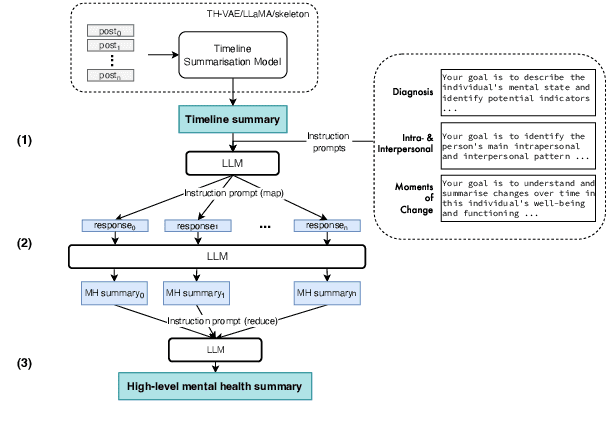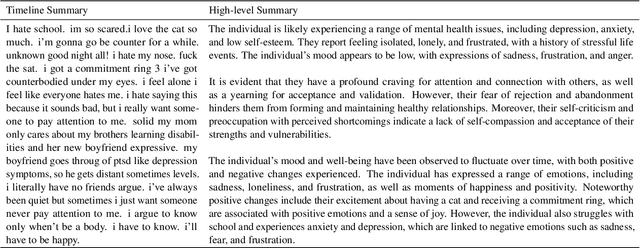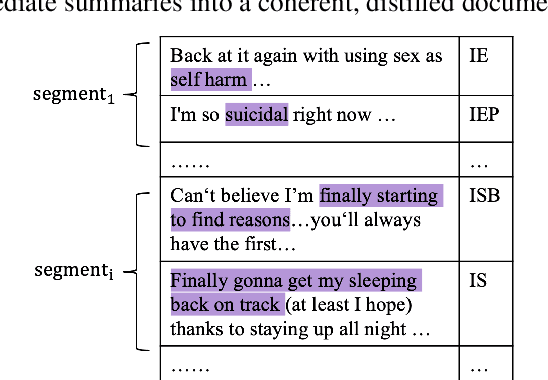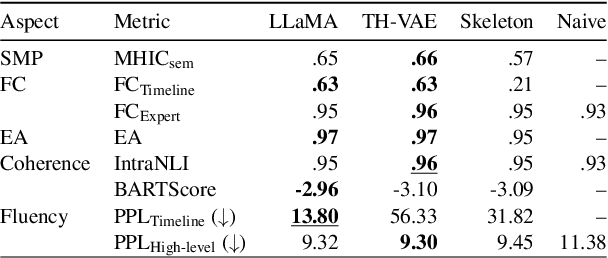Dana Atzil-Slonim
Tailored Emotional LLM-Supporter: Enhancing Cultural Sensitivity
Aug 11, 2025Abstract:Large language models (LLMs) show promise in offering emotional support and generating empathetic responses for individuals in distress, but their ability to deliver culturally sensitive support remains underexplored due to lack of resources. In this work, we introduce CultureCare, the first dataset designed for this task, spanning four cultures and including 1729 distress messages, 1523 cultural signals, and 1041 support strategies with fine-grained emotional and cultural annotations. Leveraging CultureCare, we (i) develop and test four adaptation strategies for guiding three state-of-the-art LLMs toward culturally sensitive responses; (ii) conduct comprehensive evaluations using LLM judges, in-culture human annotators, and clinical psychologists; (iii) show that adapted LLMs outperform anonymous online peer responses, and that simple cultural role-play is insufficient for cultural sensitivity; and (iv) explore the application of LLMs in clinical training, where experts highlight their potential in fostering cultural competence in future therapists.
Enhancing Depression Detection via Question-wise Modality Fusion
Mar 26, 2025Abstract:Depression is a highly prevalent and disabling condition that incurs substantial personal and societal costs. Current depression diagnosis involves determining the depression severity of a person through self-reported questionnaires or interviews conducted by clinicians. This often leads to delayed treatment and involves substantial human resources. Thus, several works try to automate the process using multimodal data. However, they usually overlook the following: i) The variable contribution of each modality for each question in the questionnaire and ii) Using ordinal classification for the task. This results in sub-optimal fusion and training methods. In this work, we propose a novel Question-wise Modality Fusion (QuestMF) framework trained with a novel Imbalanced Ordinal Log-Loss (ImbOLL) function to tackle these issues. The performance of our framework is comparable to the current state-of-the-art models on the E-DAIC dataset and enhances interpretability by predicting scores for each question. This will help clinicians identify an individual's symptoms, allowing them to customise their interventions accordingly. We also make the code for the QuestMF framework publicly available.
Clinically meaningful timeline summarisation in social media for mental health monitoring
Jan 29, 2024



Abstract:We introduce the new task of clinically meaningful summarisation of social media user timelines, appropriate for mental health monitoring. We develop a novel approach for unsupervised abstractive summarisation that produces a two-layer summary consisting of both high-level information, covering aspects useful to clinical experts, as well as accompanying time sensitive evidence from a user's social media timeline. A key methodological novelty comes from the timeline summarisation component based on a version of hierarchical variational autoencoder (VAE) adapted to represent long texts and guided by LLM-annotated key phrases. The resulting timeline summary is input into a LLM (LLaMA-2) to produce the final summary containing both the high level information, obtained through instruction prompting, as well as corresponding evidence from the user's timeline. We assess the summaries generated by our novel architecture via automatic evaluation against expert written summaries and via human evaluation with clinical experts, showing that timeline summarisation by TH-VAE results in logically coherent summaries rich in clinical utility and superior to LLM-only approaches in capturing changes over time.
NLP meets psychotherapy: Using predicted client emotions and self-reported client emotions to measure emotional coherence
Nov 22, 2022
Abstract:Emotions are experienced and expressed through various response systems. Coherence between emotional experience and emotional expression is considered important to clients' well being. To date, emotional coherence (EC) has been studied at a single time point using lab-based tasks with relatively small datasets. No study has examined EC between the subjective experience of emotions and emotion expression in therapy or whether this coherence is associated with clients' well being. Natural language Processing (NLP) approaches have been applied to identify emotions from psychotherapy dialogue, which can be implemented to study emotional processes on a larger scale. However, these methods have yet to be used to study coherence between emotional experience and emotional expression over the course of therapy and whether it relates to clients' well-being. This work presents an end-to-end approach where we use emotion predictions from our transformer based emotion recognition model to study emotional coherence and its diagnostic potential in psychotherapy research. We first employ our transformer based approach on a Hebrew psychotherapy dataset to automatically label clients' emotions at utterance level in psychotherapy dialogues. We subsequently investigate the emotional coherence between clients' self-reported emotional states and our model-based emotion predictions. We also examine the association between emotional coherence and clients' well being. Our findings indicate a significant correlation between clients' self-reported emotions and positive and negative emotions expressed verbally during psychotherapy sessions. Coherence in positive emotions was also highly correlated with clients well-being. These results illustrate how NLP can be applied to identify important emotional processes in psychotherapy to improve diagnosis and treatment for clients suffering from mental-health problems.
 Add to Chrome
Add to Chrome Add to Firefox
Add to Firefox Add to Edge
Add to Edge